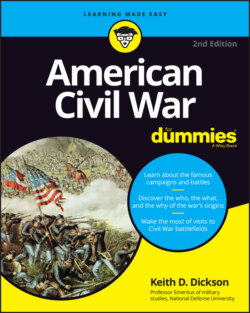Читать книгу American Civil War For Dummies - Keith D. Dickson - Страница 74
Walking the tightrope: President Buchanan
ОглавлениеIn the midst of all this activity, President Buchanan was waiting out the last few weeks of his term. His Southern sympathies and his unwillingness to stir the already troubled pot led him to pass assurances to South Carolina that he would take no aggressive action.
As much as Buchanan would have liked to wait, events set into motion by a number of individuals forced the president to take action. Several commissioners from South Carolina had arrived in Washington to meet the president and negotiate a peaceful settlement that would allow the new Confederate nation to go its own way. At the top of their list was the removal of the U.S. garrison from Fort Sumter. Buchanan would have gladly acceded to such a request, but he was faced with threats from his cabinet to resign en masse and the possibility of certain impeachment proceedings from Congress if he showed such weakness. He had to walk a political tightrope, so he took another course. Here is what he needed to do:
To satisfy the North, he had to show that the U.S. government would maintain its possessions in the seceded states.
To avoid antagonizing the South (states both seceded and not seceded), he had to assure them that his intentions were nonthreatening.
This would be a tough call for any political leader, let alone a lame duck president with only a month left in office. Nevertheless, he put a plan together to meet both requirements. Buchanan ordered that Sumter be resupplied and reinforced. But rather than use a warship, which could be seen as a provocation, a merchant ship, the Star of the West, was dispatched with supplies and troops from New York. The plan was supposed to be a secret, but then as now, nothing is a secret long in Washington. Pro-Southern spies had the information to Charleston in a flash. While useful and dramatic, this act of espionage was unnecessary. The War Department, as it had done for years, sent all of its orders and information to Major Anderson through the U.S. mail, having forgotten that the U.S. Post Office no longer existed in the sovereign nation of South Carolina. All mail addressed to Fort Sumter had been intercepted and read. It seemed that everyone knew about the resupply effort except Anderson. Sitting in a fort surrounded by water and cut off from all information, Anderson knew nothing about what the government had planned.
On the 9th of January, as expected, the Star of the West arrived outside Charleston harbor. Everyone was waiting. Most expectant of all were cadets from the Citadel, the military college of South Carolina, who were standing by heavy cannons on the shore. A cadet fired a cannon aimed at the Star of the West — a miss. This could have been the first shot of the war, with all honor and glory going to the Citadel, but the Citadel was denied such an important historical footnote because there was no response from the cannons at Fort Sumter. Other cannons around the harbor joined in, causing no damage to the Star of the West. Enough lead was flying, however, to convince the ship’s captain to turn away. Anderson watched this display from Sumter and almost returned fire to respond to the Confederate batteries, but, not knowing what the ship was doing in the harbor or why it was being fired upon, he decided to wait. A war would have to come on another day.
